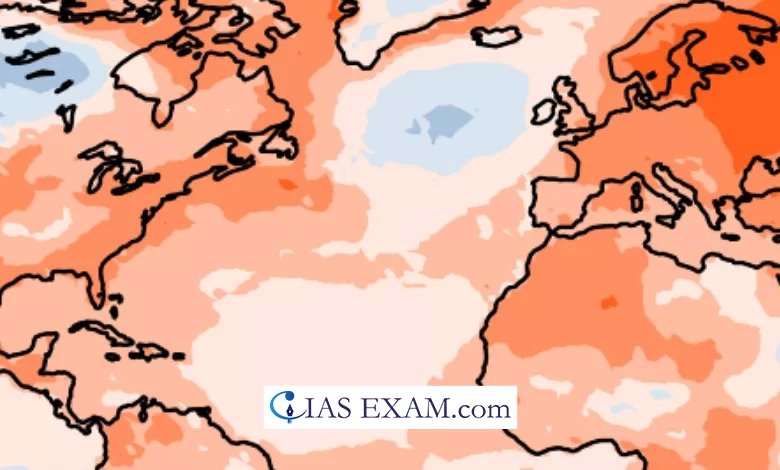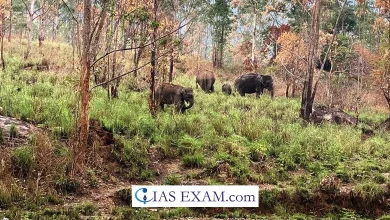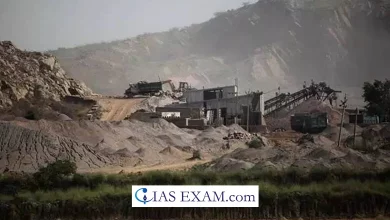Daily Current Affairs for UPSC
Europe as the World’s Fastest Warming Continent
Syllabus- Environment [GS Paper-3]

Context
According to the U.N.’s World Meteorological Organisation and the European Union’s climate agency Europe is the world’s fastest warming continent.
Key Highlights
- Europe is the fastest-warming continent and its temperatures are rising at roughly two times the global average.
- The new five-yr averages show temperatures in Europe are now running 2.3 degree C above pre-industrial levels, compared to 1.3 degree C higher globally.
- Extreme Heat Stress: The continent experienced the most number of days with ‘extreme heat stress’ and a decrease in the number of days with ‘cold stress’.
- The global meteorological agency defines ‘extreme heat stress’ as the condition when the ‘feel like’ temperature is higher than 46°C.
- Loss of Glacier Volume: Because of the strong and rapid heating, the Alps mountain range, which includes Europe’s maximum height Mont Blanc, lost 10 percent of its glacier extent in the last years, 2022 and 2023.
- In 2023, the glacier’s at the variety reduced in volume by 4.4 percent as compared to the previous year.
- More energy in Europe was generated from renewables than from fossil fuels for the second year running.
- The continent generated 43% of its strength from renewable resources last year, up from 36% the year before.
- The report focuses this year on the impact of high temperatures on human health, noting that deaths associated with heat have risen across the continent.
- More than 150 lives were lost directly in the remaining year in connection with storms, floods and wildfires.
- The cost of weather- and climate-related economic losses in 2023 were estimated at more than 13.4 billion euros.
Climate Change
- Climate change refers to long-term shifts in worldwide or regional climate patterns.
- It’s commonly driven by human activities, along with burning fossil fuels, deforestation, and industrial strategies, which release greenhouse gases like carbon dioxide (CO2) and methane into the environment.
- These gases trap heat, causing the Earth’s temperature to rise—a phenomenon known as global warming.
- Impact: It threatens the vital ingredients of precise health – easy air, secure drinking water, nutritious food supply and secure safe shelter – and has the potential to undermine decades of progress in global health.
UN Framework Convention on Climate Change (UNFCCC)
- It is a global treaty established to address the global challenge that came into force in 1994.
- Aim: To stabilize greenhouse gas concentrations at a level that will prevent dangerous human interference with the weather device.
India’s Efforts to Combat Climate Change
- Renewable Energy Expansion: India has set ambitious objectives for the renewable energy technology, aiming to increase its capability drastically.
- The country has invested heavily in solar and wind energy projects, with the intention of reducing reliance on fossil fuels and reducing greenhouse gas emissions.
- International Commitments: India is a signatory to the Paris Agreement, committing to reduce its carbon intensity and increase the proportion of non-fossil gasoline electricity assets in its overall energy mix.
- India has introduced its intention to meet 50% of its electricity demands from renewable energy sources by 2030.
- Afforestation and Forest Conservation: Recognizing the role of forests in carbon sequestration and climate regulation, India has initiated applications to increase forest cover, repair degraded lands, and promote sustainable forest management practices.
- Clean Transportation: India is selling the adoption of electric vehicles (EVs) and has set a target of 30% EV marketplace share by 2030.
- The government has delivered incentives and subsidies to support the production and adoption of EVs.
- Climate Resilience: India is investing in measures to enhance climate resilience and variation, particularly in prone sectors inclusive of agriculture, water resources, and coastal areas.
- This includes the development of climate-resilient crop varieties, water conservation techniques, and disaster preparedness measures.
- International Cooperation: India actively participates in global boards and collaborations on weather change, conducting initiatives inclusive of the International Solar Alliance and the Coalition for Disaster Resilient Infrastructure.
Source:The Hindu
UPSC Mains Practice Question
Q.‘Climate change’ is a global problem. How India will be affected by climate change? How Himalayan and coastal states of India will be affected by climate change? (2017)





.png)



